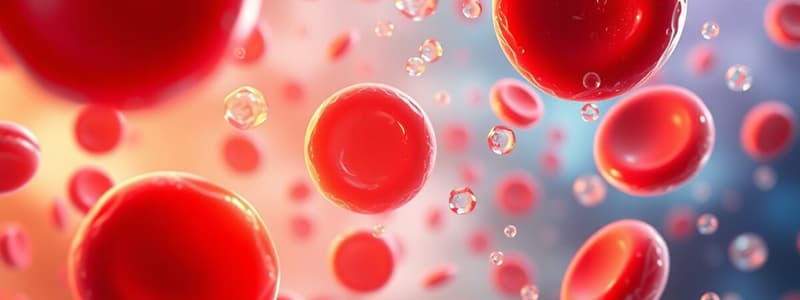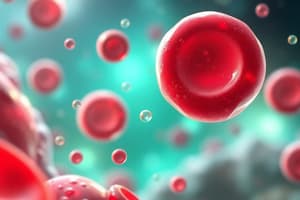Podcast
Questions and Answers
What is the primary mechanism by which aspirin functions as an antiplatelet agent?
What is the primary mechanism by which aspirin functions as an antiplatelet agent?
Which receptor does vorapaxar primarily antagonize to inhibit platelet aggregation?
Which receptor does vorapaxar primarily antagonize to inhibit platelet aggregation?
What effect does clopidogrel have in the context of platelet aggregation?
What effect does clopidogrel have in the context of platelet aggregation?
Which of the following does not contribute to increased platelet aggregation?
Which of the following does not contribute to increased platelet aggregation?
Signup and view all the answers
What is the role of dipyridamole in platelet aggregation?
What is the role of dipyridamole in platelet aggregation?
Signup and view all the answers
What is the primary mechanism of action of cilostazol?
What is the primary mechanism of action of cilostazol?
Signup and view all the answers
Which of the following side effects is most commonly associated with cilostazol?
Which of the following side effects is most commonly associated with cilostazol?
Signup and view all the answers
Which statement about prasugrel compared to clopidogrel is accurate?
Which statement about prasugrel compared to clopidogrel is accurate?
Signup and view all the answers
What is the main therapeutic use of abciximab?
What is the main therapeutic use of abciximab?
Signup and view all the answers
Which of the following antiplatelet agents does not require activation to exert its effect?
Which of the following antiplatelet agents does not require activation to exert its effect?
Signup and view all the answers
What potential adverse effect is specifically associated with ticagrelor?
What potential adverse effect is specifically associated with ticagrelor?
Signup and view all the answers
How quickly does peak platelet inhibition occur after the administration of abciximab?
How quickly does peak platelet inhibition occur after the administration of abciximab?
Signup and view all the answers
What effect does low-dose aspirin have on TXA2 synthesis?
What effect does low-dose aspirin have on TXA2 synthesis?
Signup and view all the answers
Why does aspirin have a prolonged effect on platelet aggregation?
Why does aspirin have a prolonged effect on platelet aggregation?
Signup and view all the answers
What is the primary role of dipyridamole in treatment?
What is the primary role of dipyridamole in treatment?
Signup and view all the answers
What adverse effect is commonly associated with aspirin use?
What adverse effect is commonly associated with aspirin use?
Signup and view all the answers
What is Aggrenox composed of?
What is Aggrenox composed of?
Signup and view all the answers
In which situation is aspirin contraindicated?
In which situation is aspirin contraindicated?
Signup and view all the answers
How does dipyridamole increase cAMP levels in platelets?
How does dipyridamole increase cAMP levels in platelets?
Signup and view all the answers
What is the major limitation of dipyridamole in thromboembolic disorder treatment?
What is the major limitation of dipyridamole in thromboembolic disorder treatment?
Signup and view all the answers
Flashcards
What are platelet aggregation inhibitors?
What are platelet aggregation inhibitors?
Platelet aggregation inhibitors are medications that reduce the tendency of platelets to clump together and form clots.
How do platelets initiate clotting?
How do platelets initiate clotting?
Platelets stick to damaged endothelium via glycoprotein receptors, leading to the release of clotting factors like thromboxane A2, ADP, and serotonin.
How does aspirin affect platelet aggregation?
How does aspirin affect platelet aggregation?
Aspirin inhibits the enzyme cyclooxygenase (COX), thereby preventing the synthesis of thromboxane A2, a potent platelet activator.
What is the general mechanism of action for aspirin and NSAIDs?
What is the general mechanism of action for aspirin and NSAIDs?
Signup and view all the flashcards
What are the opposing roles of prostacyclin and thromboxane A2 in platelet aggregation?
What are the opposing roles of prostacyclin and thromboxane A2 in platelet aggregation?
Signup and view all the flashcards
Antiplatelet drug
Antiplatelet drug
Signup and view all the flashcards
Aspirin
Aspirin
Signup and view all the flashcards
Aspirin's Mechanism of Action
Aspirin's Mechanism of Action
Signup and view all the flashcards
Aspirin Dosage
Aspirin Dosage
Signup and view all the flashcards
Prostacyclin
Prostacyclin
Signup and view all the flashcards
Thromboxane A2 (TXA2)
Thromboxane A2 (TXA2)
Signup and view all the flashcards
Dipyridamole
Dipyridamole
Signup and view all the flashcards
Aggrenox
Aggrenox
Signup and view all the flashcards
What does Cilostazol do?
What does Cilostazol do?
Signup and view all the flashcards
What do ADP inhibitors do?
What do ADP inhibitors do?
Signup and view all the flashcards
How do Clopidogrel and Prasugrel work?
How do Clopidogrel and Prasugrel work?
Signup and view all the flashcards
How do Cangrelor and Ticagrelor work?
How do Cangrelor and Ticagrelor work?
Signup and view all the flashcards
How does Abciximab work?
How does Abciximab work?
Signup and view all the flashcards
How does Vorapaxar work?
How does Vorapaxar work?
Signup and view all the flashcards
Study Notes
Platelet Aggregation Inhibitors
- Platelets adhere to damaged endothelium via GP-1a and GP-1b receptors, leading to synthesis and release of aggregation mediators like TXA2, ADP, and 5-HT.
- These mediators increase GP receptor expression, promoting platelet aggregation via fibrinogen binding to GP2b/3a receptors.
- Non-steroidal anti-inflammatory drugs (NSAIDs) inhibit thromboxane A2 synthesis by blocking cyclooxygenase (COX).
- Clopidogrel, prasugrel, and ticagrelor block ADP receptors (P2Y12).
- Agents like eptifibatide, tirofiban, and abciximab bind to GP2b/3a proteins, inhibiting fibrinogen cross-linking.
- Vorapaxar is an antagonist at PAR-1 receptors, targeting thrombin.
- Dipyridamole inhibits adenosine reuptake, increasing cAMP, decreasing calcium and platelet aggregation.
- Cilostazol inhibits PDE3, elevating cAMP levels.
Aspirin
- Aspirin is a non-steroidal anti-inflammatory drug (NSAID) with analgesic, antipyretic, and anti-inflammatory effects.
- It inhibits prostaglandin synthesis, notably thromboxane A2 (TXA2) synthesis more than prostacyclin (PGI2) synthesis at low doses.
- Aspirin irreversibly inhibits cyclooxygenase, the enzyme responsible for TXA2 synthesis, thus reducing platelet aggregation for the lifespan of the platelet.
- It is used to prevent arterial thrombosis in patients with ischemic heart disease and stroke.
- Adverse effects include bleeding, particularly gastrointestinal bleeding due to reduced bicarbonate secretion.
- Pregnancy, especially in the third trimester, and hypersensitivity are contraindications.
Dipyridamole
- Dipyridamole is a coronary vasodilator and relatively weak antiplatelet drug.
- It inhibits platelet aggregation by blocking adenosine uptake, leading to increased cAMP levels and reduced calcium release.
- Lowers platelet aggregation.
- It is used in combination with aspirin, potentially improving stroke prevention.
Cilostazol
- Cilostazol is a vasodilator and antiplatelet drug that inhibits type 3 phosphodiesterase (PDE3).
- Increases cAMP levels in platelets and blood vessels, reducing platelet aggregation
- Often indicated for intermittent claudication, a peripheral vascular disease.
Adenosine Diphosphate Inhibitors (ADP)
- Clopidogrel, prasugrel, cangrelor, and ticagrelor inhibit ADP binding to its platelet receptors, hindering GPIIb/IIIa activation and subsequent fibrinogen binding.
- Clopidogrel and prasugrel are irreversible inhibitors.
- Cangrelor and ticagrelor are reversible inhibitors, used in situations like surgery.
Glycoprotein IIb/IIIa Antagonists
- Abciximab is a monoclonal antibody that blocks GP IIb/IIIa receptors, preventing platelet aggregation by hindering fibrinogen binding. Its IV management achieves peak inhibition rapidly but is short-lived.
Vorapaxar
- Vorapaxar is a protease-activated receptor-1 (PAR-1) antagonist, preventing platelet aggregation via thrombin's influence on platelets.
- Approved for patients with MI history or peripheral arterial disease.
Thrombolytic Drugs
- Thrombolytic drugs convert plasminogen to plasmin, which breaks down fibrin and fibrinogen in blood clots.
- First-generation includes streptokinase and urokinase.
- Second-generation includes reteplase and alteplase ,which are fibrin-selective.
- Used to treat acute myocardial infarction, pulmonary embolism, deep vein thrombosis, and acute ischemic stroke.
- Hemorrhage is a major side effect due to their non-discriminating action on fibrin.
Studying That Suits You
Use AI to generate personalized quizzes and flashcards to suit your learning preferences.
Related Documents
Description
Explore the mechanisms and effects of platelet aggregation inhibitors, including the role of various mediators and specific drugs like aspirin and clopidogrel. This quiz covers important pharmacological aspects and interactions relevant to thrombus formation and prevention.




